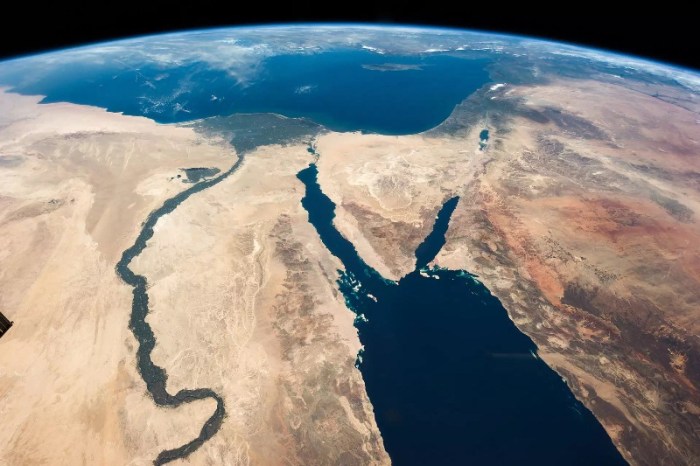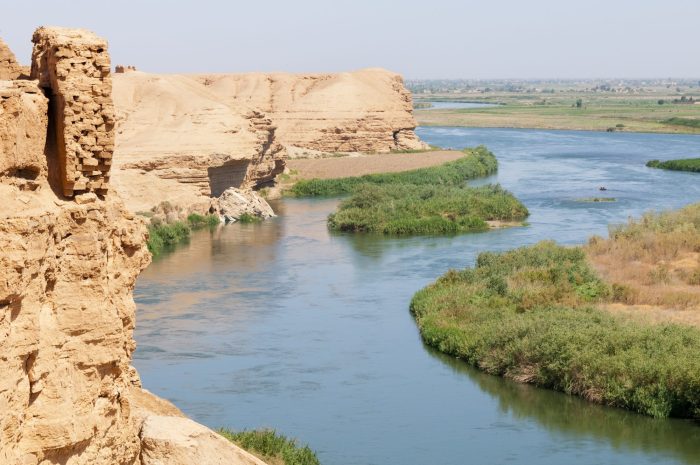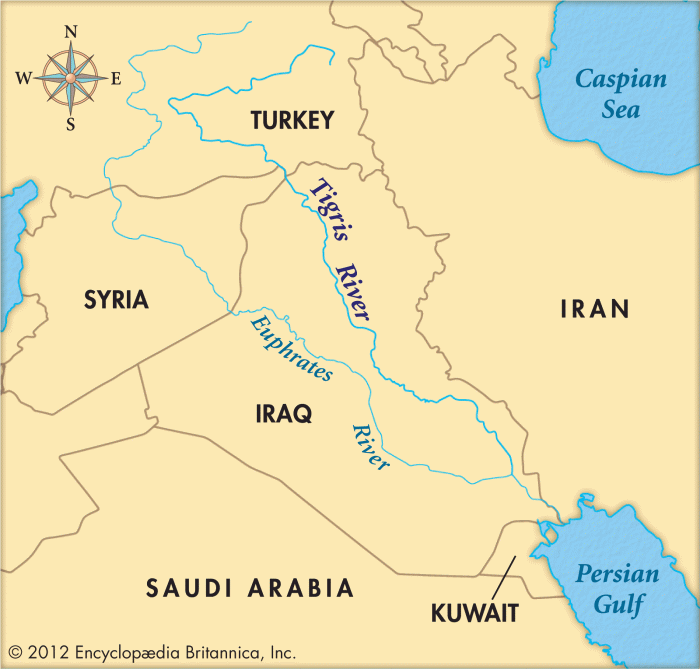Nile and euphrates river in islam – The Nile and Euphrates rivers hold profound significance in Islam, playing a central role in religious texts, economic prosperity, geographical formations, and cultural traditions. This article explores the multifaceted impact of these rivers on Islamic civilization, highlighting their historical, economic, geographical, and cultural importance.
Throughout history, the Nile and Euphrates rivers have been revered as sacred waterways, mentioned in the Quran and associated with numerous religious narratives. Their economic value stems from their agricultural productivity, supporting thriving civilizations along their banks. The geographical impact of these rivers is evident in the formation of major settlements and the shaping of landscapes.
Moreover, the Nile and Euphrates rivers have profoundly influenced art, literature, and music, inspiring cultural traditions and practices that continue to this day.
Religious Significance
The Nile and Euphrates rivers hold profound religious significance in Islam. The Quran frequently mentions these rivers as symbols of divine provision, abundance, and the blessings of Allah.
The Nile, known as “the River of Egypt” in the Quran, is associated with the story of Prophet Moses and the liberation of the Israelites from slavery in Egypt. The river played a crucial role in the Israelites’ escape, providing a path through the Red Sea and a source of sustenance during their journey.
The Euphrates, on the other hand, is often mentioned in the Quran alongside the Tigris River as the boundaries of the ancient Mesopotamian civilizations. The region between these two rivers, known as the “Fertile Crescent,” was home to some of the earliest human civilizations and is considered a cradle of civilization.
Symbolic Meanings
- Life and Fertility:The Nile and Euphrates rivers are symbols of life and fertility, providing water and sustenance to the surrounding lands.
- Divine Provision:The Quran emphasizes the importance of these rivers as a source of divine provision, reminding believers of Allah’s blessings and the abundance of His creation.
- Spiritual Purification:The rivers are also associated with spiritual purification, as they are mentioned in the Quran as a place where the faithful can perform ablutions before prayer.
Economic Importance: Nile And Euphrates River In Islam

The Nile and Euphrates rivers have played a pivotal role in the economic development of the regions they flow through. Their agricultural significance, trade routes, and economic benefits have shaped the history and prosperity of civilizations for centuries.
Agricultural Significance
- Fertile Land:The Nile and Euphrates rivers provide fertile land for agriculture, allowing civilizations to flourish in otherwise arid regions.
- Irrigation:The rivers’ waters are used for irrigation, enabling farmers to grow crops throughout the year and increase their yields.
- Subsistence and Trade:The abundance of crops produced along the rivers provided sustenance for local populations and generated surplus for trade.
Trade and Commerce
- Trade Routes:The Nile and Euphrates rivers served as vital trade routes, connecting civilizations across vast distances.
- Transportation:The rivers facilitated the transportation of goods and people, fostering economic exchange and cultural diffusion.
- Economic Hubs:Cities and towns along the rivers became economic hubs, attracting merchants, traders, and skilled artisans.
Geographical Impact

The Nile and Euphrates rivers have had a profound geographical impact on the regions they flow through. Their presence has influenced the formation of civilizations, settlements, and the surrounding environment.
Formation of Civilizations and Settlements
- Settlements:The availability of water and fertile land along the rivers attracted human settlements, leading to the establishment of cities and civilizations.
- Mesopotamia:The region between the Tigris and Euphrates rivers, known as Mesopotamia, was home to some of the earliest human civilizations, including the Sumerians, Babylonians, and Assyrians.
- Ancient Egypt:The Nile River played a central role in the development of ancient Egyptian civilization, providing water, transportation, and fertile land for agriculture.
Environmental and Ecological Effects, Nile and euphrates river in islam
- Fertile Soil:The rivers’ sediments have created fertile soil, supporting diverse plant and animal life in the surrounding ecosystems.
- Waterways:The rivers provide vital waterways for fish, birds, and other aquatic species.
- Wetlands:The rivers’ floodplains and deltas create wetlands, which support unique biodiversity and provide ecosystem services such as flood control and water filtration.
Cultural Influence

The Nile and Euphrates rivers have had a profound cultural influence on the regions they flow through. Their presence has shaped art, literature, music, and cultural traditions and practices.
Art and Literature
- Ancient Egyptian Art:The Nile River is depicted in numerous ancient Egyptian paintings, sculptures, and hieroglyphics, symbolizing life, fertility, and the divine.
- Mesopotamian Literature:The rivers Tigris and Euphrates are mentioned in Mesopotamian myths, epics, and historical texts, highlighting their importance in the region’s cultural identity.
- Contemporary Art:Modern and contemporary artists continue to draw inspiration from the rivers, using them as subjects or symbols in their works.
Cultural Traditions and Practices
- Religious Festivals:The Nile River is central to religious festivals in Egypt, such as the annual Nile Festival, which celebrates the river’s life-giving waters.
- Cultural Practices:The rivers have influenced cultural practices such as fishing, boat-building, and water management.
- Tourism:The Nile and Euphrates rivers are popular tourist destinations, attracting visitors interested in their historical, cultural, and natural significance.
FAQ Explained
What is the religious significance of the Nile and Euphrates rivers in Islam?
The Nile and Euphrates rivers are mentioned in the Quran as sacred waterways associated with religious narratives and symbolism.
How did the Nile and Euphrates rivers contribute to the economic prosperity of Islamic civilization?
The fertile lands along the Nile and Euphrates rivers supported agriculture, trade, and commerce, leading to the development of prosperous civilizations.
What was the geographical impact of the Nile and Euphrates rivers?
The Nile and Euphrates rivers influenced the formation of settlements, the development of irrigation systems, and the shaping of landscapes.
In what ways have the Nile and Euphrates rivers influenced Islamic culture?
The Nile and Euphrates rivers have inspired art, literature, music, and cultural traditions, becoming symbols of Islamic heritage and identity.